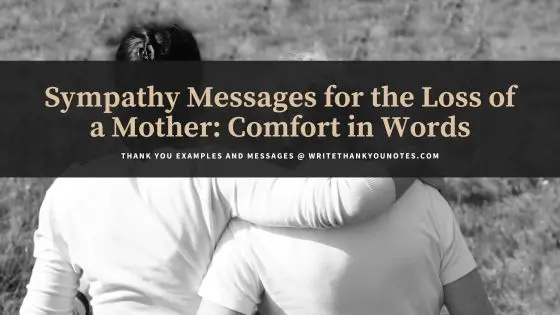What if your friend’s mom is healing from a traumatic injury or given a terminal prognosis, or your boss’s family is stuck in another country due to a tyrannical government? How do you help a friend who is hurting? Sometimes you may feel like you cannot help because what they are enduring frightens you, or it is something to which you just cannot relate.
Your instinct might be to say nothing instead of risking saying the wrong thing. This is natural. However, as a wise person once said, “I’d rather have my friend sitting beside me, saying the wrong thing, than not hearing from my friend at all.”
“The greatest sympathy gift you can give a hurting friend or loved one is you. Your presence, compassion, patience and caring are the greatest gifts you could ever give to help them get through a difficult time.” – Michelle Pommells
Words to Comfort a Friend Dealing with Loss
Sharing your sincere sentiments and sympathy go a long way in helping others cope with their grief. Nothing can take away their immediate pain and suffering, but they may find some measure of comfort and relief in your expressed condolences.
If you have a friend who is dealing with the impending loss of a cherished loved one, here are some words to share, preferably in-person or over the phone. Sharing in their grief will help your friend and their family feel less isolated, and create a stronger community.
You might opt to write your friend a letter or send a sympathy card. This is greatly appreciated, as they can refer to your card and meditate on your encouraging words in their own time, when they feel like it.
“It’s so much darker when a light goes out than it would have been if it had never shone.”
John Steinbeck
- “I’m so sorry [for your loss]” or a simple “I’m sorry” is the standard condolence but it summarizes the sentiment. Acknowledging the death or illness of a loved one is important, even if it is uncomfortable for you.
- “May I pray for you right now?” Depending on your style and beliefs, offer to pray with your friend. Even just simply saying, “You’ve been on my heart lately, I pray for you that you might know the depth of love and solace embracing you,” is touching, even if you or your friend would rather not pray right at that moment.
- “What do you need right now?” Grief is a roller-coaster ride of seemingly unending sadness juxtaposed with deep appreciation and even moments of levity. Everyone has days and moments of laughing and crying. Sometimes a person will be outside cutting the lawn, having a good day, and all of a sudden they’ll get emotional over something that reminds them of their loved one. No matter the age, a death or illness in the family involves changes and adjustments, resulting in all sorts of emotions. So be patient with your friend. Know that sometimes they might just need to be alone, and at other times they will want to do something to take their focus off their pain.
- If you know their loved one well, it is okay to express your own heartache and concern: “I have always considered your brother as a member of my own family. Seeing him feeling unwell hurts my heart.” This is appropriate for a close relationship and reminds your friend that they are not alone in their feelings.
- “I wish your brother a speedy recovery. I know you guys are very close.” Acknowledging your friend’s depth of feeling is important and can help them feel understood in their time of emotional need.
“The reason it hurts so much to separate is because our souls are connected.”
Nicholas Sparks
Words of Comfort for a Friend or Loved One Going Through a Hard Time
While the loss of a job or the stress of a failed accomplishment may seem trivial compared to the loss of life, we all need the loving support of our friends and family. A diagnosis of terminal cancer, an experimental medical treatment rolled out without informed consent — whatever the cause of a loss of trust in the world, a forced new normal can feel devastating and disorienting.
Listen
As for the rights words to say? What works for one person doesn’t work for another; people are different and respond in different ways. Sometimes by simply saying, I’m here, you’re going to give so much more comfort than talking.
- Let the person know that you’re here to help in any way you’re able, and actually take action to do it!
- Instead of trying to give advice on how to fix their situation, let them pour out their thoughts and heart to you.
- It is comforting to know that someone wants to listen, and you may not be capable of relating to what is happening in their life; you are capable of being the soundboard and ear they need.
- Allow the person to talk about what happened and how they feel, even if they become visibly upset.
Offer Heartfelt Words
You might be worried about what to say, but the point is to let your friend know you care about them. Keep it as short and simple as you need. More messages to encourage and support friends in the face of adversity.
- You, my friend, are the family I choose. I am here for you no matter what. Lean on me and let me help you get through this. You’ve carried me through my own personal storms, I admire your strength; now is the time to let me return your kindness.
- I’m here with you every step of the way.
- Nothing I can say will make this better, but know that I’m here for you always.
- I am so sorry you are going through this.
- I would like to bring your family a meal this week, would that be okay?
- What is it I can be praying for you?
- I’d love to babysit for a night this week, let me know which day you’d like a rest.
- I care about you.
- I love you.
- I don’t know what these next few days and weeks will be like for you, but I’ll always be here for you.
- I’d love to take you out somewhere and talk about whatever you want. When can I come by?
- Is there a resource I can read to learn more about what you’re going through?
- This [sadness] does not define you.
- Can I hug you?
- This is just one chapter in your life, not the whole story.
- The strongest people are not those who show strength in front of us, but those who win battles we know nothing about.
- I wish I could take all of this pain and sorrow from you, but for now I will offer my hand to hold and my shoulder to lean upon.
- It’s okay to be scared. Being scared means you’re about to do something important.
- You’re stronger than you know, braver than you think, and more loved than you can imagine.
- So glad you are home and recovering. My thoughts and prayers continue to be with you!
Example of a letter of support for a friend
Dear Larry,
I was sorry to hear that your efforts to keep the new highway from going through your property were unsuccessful. I remember the day twenty years ago when you took me out to see that poor neglected piece of land. You certainly have worked wonders with it.
I hope you can find some way of living with this or maybe even of finding some good in it (I know, I don’t see any either at the moment). From studying the paper, I see that most of your place will remain untouched, but that’s not very comforting when you’re facing the havoc to the rest of it.
I’ll stop by one of these weekends to see how it’s going.
Note expressing solidarity after hearing bad news of business hardship or vandalism:
Dear Mr. Harris,
I’ve just heard about the robbery and vandalism you had at the store last night. That is surely one of the greatest nightmares of any small business owner.
Can I help? What do you need? I thought you could use an extra pair of hands, so I’m sending this note over with Lily Cross, my assistant manager. She can stay until 5 p.m., helping you with whatever needs doing.
I’ll give you a call tomorrow, but if I can do anything for you between now and then, let me know.
Offer Specific Help
Is your friend suddenly caring for an ill family member? Instead of asking your friend how you can help, tell them specifically what you’re able to help with. For example:
- may I come over and change the linens,
- clean out the refrigerator,
- prepare meals,
- clean the house,
- bring teas for when visitors come,
- read to the patient while you nap.
Or maybe your friend is the one being treated for an illness, in which case let your friend know that everything will be taken care of. Offer to help with transportation to receive or administer treatment and run other errands required for day-to-day life. Their focus should be on healing, not worrying.
- Plan regular visits. We are social animals and thrive off personal interactions, especially with those who we feel comfortable around. During this difficult time, it’s crucial to show your support by planning regular visits. This will give your friend or family member a sense of community, belonging, love, and help them feel human again.





